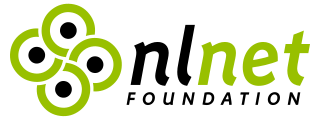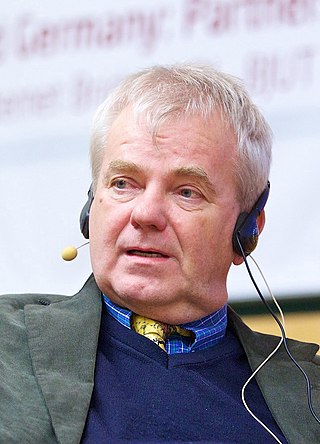
Teus Hagen (* 6 October 1945 in Wijnjeterp) [1] is a Dutch Internet pioneer.

Teus Hagen (* 6 October 1945 in Wijnjeterp) [1] is a Dutch Internet pioneer.
Hagen started his career at the Computer Laboratory of the Mathematical Centre. [2] Later, he initiated the Dutch and the European Unix User Groups NLUUG and EUUG (that became later EURopen). As chairman of EUUG, he started the European Unix Network (EUnet) in 1982 as the EUUG dial-up service. EUnet was the first public wide area network. [3]
At the University of California, Berkeley, he started in 1983 working with TCP/IP. One of his team members, Daniel Karrenberg, is the author of the report in favor of TCP/IP for global networking in Europe. [3]
From 1992 to 2008 Hagen was chairman and director at NLnet and helped it to become the first Dutch Internet Service Provider. NLnet funds free Internet research and development. In this position, Hagen became 2004 involved with the community-driven certificate authority CAcert.org and served as board member and in 2008 as president. [2]
Hagen was recognized by NLUUG [4] and Usenix for his open-source contributions and honoured as "Global Connector" in the Internet Hall of Fame in 2013. [3]

The history of the Internet has its origin in the efforts of scientists and engineers to build and interconnect computer networks. The Internet Protocol Suite, the set of rules used to communicate between networks and devices on the Internet, arose from research and development in the United States and involved international collaboration, particularly with researchers in the United Kingdom and France.
The Internet protocol suite, commonly known as TCP/IP, is a framework for organizing the set of communication protocols used in the Internet and similar computer networks according to functional criteria. The foundational protocols in the suite are the Transmission Control Protocol (TCP), the User Datagram Protocol (UDP), and the Internet Protocol (IP). Early versions of this networking model were known as the Department of Defense (DoD) model because the research and development were funded by the United States Department of Defense through DARPA.

XS4ALL was an Internet service provider (ISP) in the Netherlands. It was founded in 1993 as an offshoot of the hackers club Hack-Tic by Felipe Rodriquez, Rop Gonggrijp, Paul Jongsma and Cor Bosman, while based in Amsterdam. It was the sixth provider in the Netherlands and the second company to offer Internet access to private individuals. Initially only offering dial-in services via modem and ISDN, it later expanded to offer dial-up access as well as ADSL, VDSL, and fiber-optic (FTTH) services as well as mobile internet. The name is a play on the English pronunciation of access for all.

The NLUUG is an association of professional UNIX and Linux users in the Netherlands. The group aims to increase and extend the awareness and use of Open Standards and similar open systems and Open Source software.

Bob Kahn is an American electrical engineer who, along with Vint Cerf, first proposed the Transmission Control Protocol (TCP) and the Internet Protocol (IP), the fundamental communication protocols at the heart of the Internet.
IPX/SPX stands for Internetwork Packet Exchange/Sequenced Packet Exchange. IPX and SPX are networking protocols used initially on networks using the Novell NetWare operating systems. They also became widely used on networks deploying Microsoft Windows LANs, as they replaced NetWare LANs, but are no longer widely used. IPX/SPX was also widely used prior to and up to Windows XP, which supported the protocols, while later Windows versions do not, and TCP/IP took over for networking.
William Richard (Rich) Stevens was a Northern Rhodesia–born American author of computer science books, in particular books on Unix and TCP/IP.

Wietse Zweitze Venema is a Dutch programmer and physicist best known for writing the Postfix email system. He also wrote TCP Wrapper and collaborated with Dan Farmer to produce the computer security tools SATAN and The Coroner's Toolkit.

The NLnet Foundation supports organizations and people that contribute to an open information society. It was influential in spreading the Internet throughout Europe in the 1980s. In 1997, the foundation sold off its commercial networking operations to UUNET, resulting in an endowment with which it makes grants.
The Berkeley r-commands are a suite of computer programs designed to enable users of one Unix system to log in or issue commands to another Unix computer via TCP/IP computer network. The r-commands were developed in 1982 by the Computer Systems Research Group at the University of California, Berkeley, based on an early implementation of TCP/IP.
Peter Thomas Kirstein was a British computer scientist who played a role in the creation of the Internet. He made the first internetworking connection on the ARPANET in 1973, by providing a link to British academic networks, and was instrumental in defining and implementing TCP/IP alongside Vint Cerf and Bob Kahn.
A network socket is a software structure within a network node of a computer network that serves as an endpoint for sending and receiving data across the network. The structure and properties of a socket are defined by an application programming interface (API) for the networking architecture. Sockets are created only during the lifetime of a process of an application running in the node.

SURF is an organization that develops, implements and maintains the national research and education network (NREN) of the Netherlands. It operates the national research network formally called SURFnet.
EUnet was a very loose collaboration of individual European UNIX sites in the 1980s that evolved into the fully commercial entity EUnet International Ltd in 1996. It was sold to Qwest in 1998. EUnet played a decisive role in the adoption of TCP/IP in Europe beginning in 1988.

Douglas Earl Comer is a professor of computer science at Purdue University, where he teaches courses on operating systems and computer networks. He has written numerous research papers and textbooks, and currently heads several networking research projects. He has been involved in TCP/IP and internetworking since the late 1970s, and is an internationally recognized authority. He designed and implemented X25NET and Cypress networks, and the Xinu operating system. He is director of the Internetworking Research Group at Purdue, editor of Software - Practice and Experience, and a former member of the Internet Architecture Board. Comer completed the original version of Xinu in 1979. Since then, Xinu has been expanded and ported to a wide variety of platforms, including: IBM PC, Macintosh, Digital Equipment Corporation VAX and DECstation 3100, Sun Microsystems Sun-2, Sun-3 and SPARCstations, and Intel Pentium. It has been used as the basis for many research projects. Furthermore, Xinu has been used as an embedded system in products by companies such as Motorola, Mitsubishi, Hewlett-Packard, and Lexmark.

Dennis M. Jennings is an Irish physicist, academic, Internet pioneer, and venture capitalist. In 1985–1986 he was responsible for three critical decisions that shaped the subsequent development of NSFNET, the network that became the Internet.

Cornelis Adrianus Maria "Kees" Neggers is a Dutch Internet pioneer. He is best known for starting and promoting many initiatives for international collaboration in research and education networking.

Werner Zorn is a German computer scientist and Internet pioneer.
The Protocol Wars were a long-running debate in computer science that occurred from the 1970s to the 1990s, when engineers, organizations and nations became polarized over the issue of which communication protocol would result in the best and most robust networks. This culminated in the Internet–OSI Standards War in the 1980s and early 1990s, which was ultimately "won" by the Internet protocol suite (TCP/IP) by the mid-1990s when it became the dominant protocol suite through rapid adoption of the Internet.